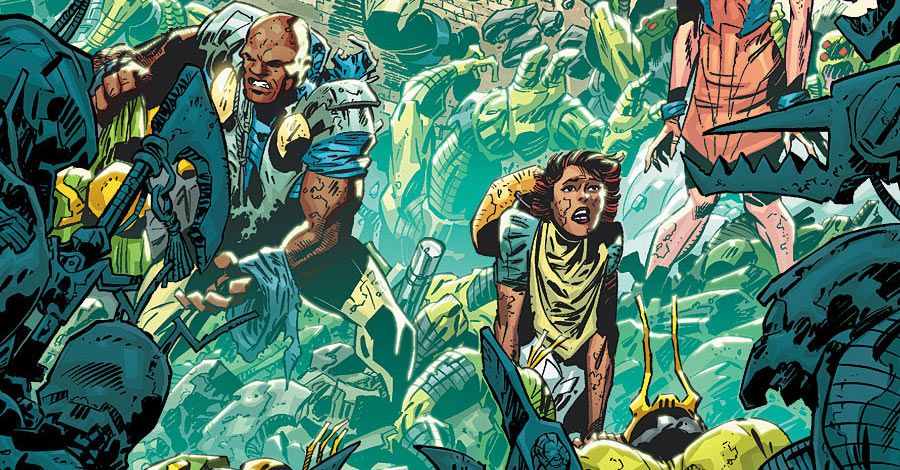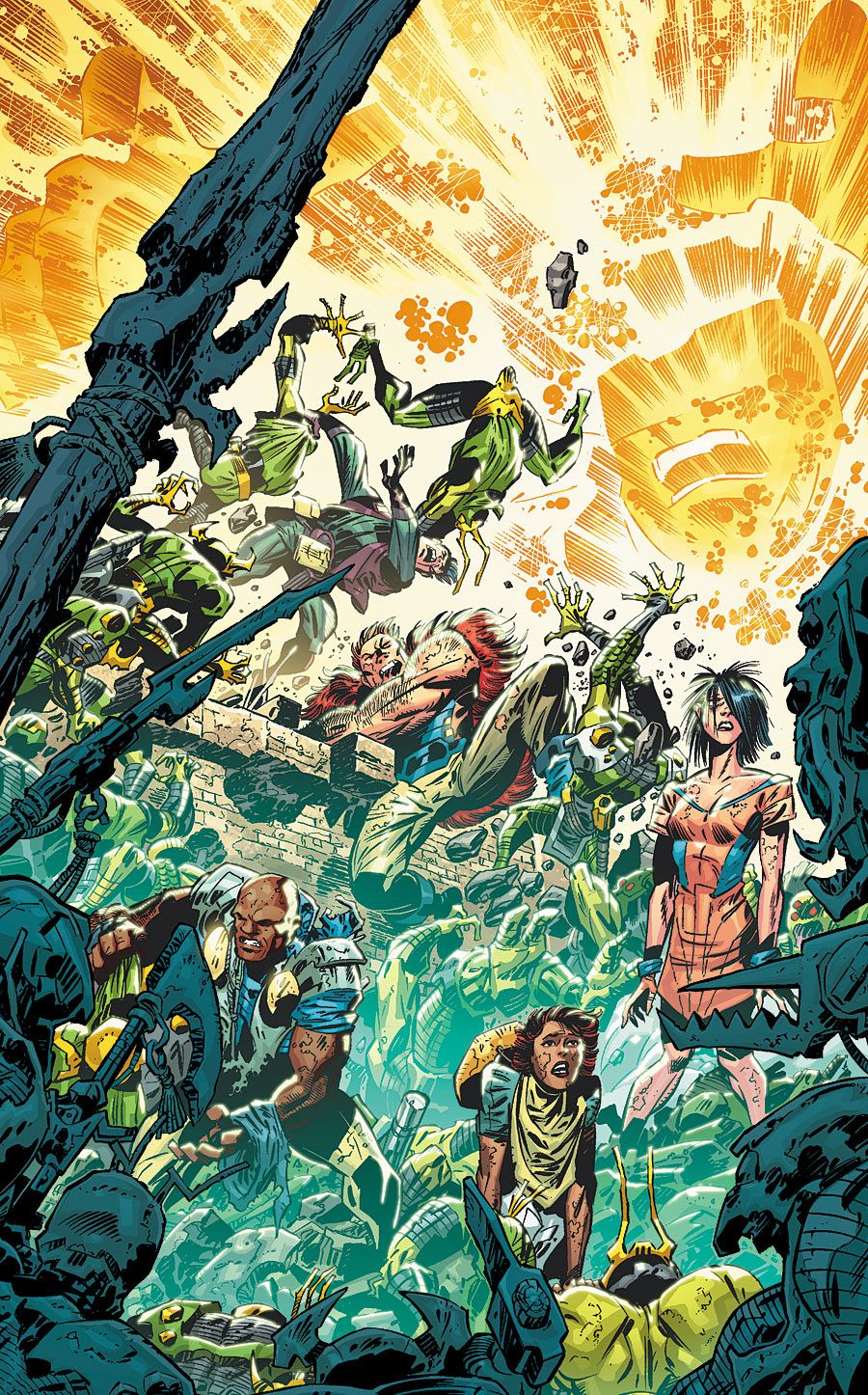DC Comics co-publisher Dan DiDio has a side job: Comic book writer. Through much of his stint as a top-level editorial executive for the publisher, he's also written quite a few titles, including runs on "The Outsiders," "Phantom Stranger" and "O.M.A.C."
In June, DiDio reunites with his "O.M.A.C." collaborators -- co-writer and artist Keith Giffen and artist Scott Koblish -- to take on another Kirby creation, "Infinity Man and the Forever People." The New 52 title is based on concepts and characters first introduced in 1971 by comics legend Jack Kirby, as part of his Fourth World saga.
In that tradition, DiDio says "Infinity Man and the Forever People" is positioned to introduce the larger world of the New Gods to the current DC Universe. In an interview with CBR News, DiDio -- noticably enthused about the book -- discussed bringing Kirby's creation into the world of The New 52, and his love for the more undiscovered characters on DC's roster.
CBR News: Dan, let's talk "Infinity Man and the Forever People," as there hasn't really been much about it out there yet.
Dan DiDio: I'm always excited to talk about "Infinity Man and the Forever People." We really wanted to get something that had a level of gravitas, and a real sense of energy. We've got the energy, but we're having a hell of a lot of fun doing it, too.
I love working with Keith. I pretty much start my day on the phone with him, just going over pages and what he's working on; riffing on different plots and beats, just how the whole thing's playing out. This morning we spent discussing what Mantis looks like, which was the highlight of my day, I have to say. We were talking about the various interpretations, and how we wanted to bring so many of these characters back to books like this. I think there's just a level of fun and energy that I find missing every once in a while when I pick up series that I'm hoping we're able to deliver with this book.
I'm curious to hear a little bit more about how you and Keith arrived at this as the next book you're tackling, because I don't think anyone predicted this relaunch was coming. Obviously, you have a history of taking on Kirby characters after your run on "O.M.A.C.," but how did you get to this place?
We have a lot of love for the Kirby material, as you can tell. I was always a huge fan of Keith's artwork, and there was a time there where he was doing this really strong Kirby riff that I always remember, that I kept on trying to entice him to do more and more in our books. When he brought it to "O.M.A.C.," he was shocked about how much fun he had drawing in that style. More importantly, he was even more amazed about how well people reacted to it. We both thought, "What's a fun idea to follow up!"
It's funny, because when I heard people discussing Kamandi -- well, of course we discussed Kamandi. I'm going to tell you a secret about Kamandi -- almost every creator that works in DC Comics has pitched us a "Kamandi" idea once before. And truth be told, the hardest thing about coming up with a new "Kamandi" series is that we have too many great people that want to work on it. It's hard to choose what direction to go, so it sort of just sits there, for the time being. Believe it or not, nobody's ever pitched me Forever People. [Laughs] And that's the fun part. That's the challenge of it all. There are certain characters you just have a fun recollection of and memory about, but then, when you go back and read the source material, you're trying to glean what was so exciting about them the first time you did. That's the real intriguing part about working on some of these properties.
When you think about Jack Kirby -- Jack Kirby was writing, drawing and editing a book a week. Think about that. Think about how the process works today, [and] there he is, writing, drawing and editing a single book a week. So much raw emotion and so much of his personality is there. But structure might be tough to come by, because you're just moving so quickly. It's fun to see all of that raw energy, brilliant ideas and find a way to extrapolate them, and to give them more form and structure and story, and to bring them into a sensibility that works for today. I think it's a great challenge, and if we're able to do that, then I think it's a great win for the fans -- and for ourselves, too.
When you look at the books that you've written at DC over the years, your work has definitely tilted more towards obscure characters. Is that just a reflection of your own sensibilities, and what interests you?
A hundred percent. I love the edges of the DCU. That's what brought me into DC Comics. It wasn't about Justice League, Superman and Batman, it really was about all of the crazy characters that inhabit the corners of the DCU. The one guy that I never got to write which I always loved was Adam Strange. But I got to do "Metal Men;" I love the Metal Men. And characters like the Forever People and O.M.A.C. and Phantom Stranger have such a warm place in my heart. To be part of creating their history and story is a lot of fun.
"O.M.A.C." was a well-appreciated The New 52 launch title -- even though it had a short run, a lot of people really seemed to liked it, the vibe and energy of it. Since this is the same creative team, can we expect a similar type of vibe?
I really wanted to take time on a team book to really get a chance to introduce these characters, and who they are, and their sensibilities. We get a good sense of who they are on New Genesis, and then when they finally make it to Venice Beach, California -- because, naturally, we had to put them in a setting where they could blend in easily. So not only is DC moving to the west coast, but so are the Forever People. [Laughs]
That was a fun set-up, but we get right into the heart of the story, and get right back into the characters. Mantis is our first major villain that we come across. It plays against the theme of the Forever People, which is basically the idea that they're on Earth to help Earth move forward, but in an effort to make mankind a tool for the New Gods, in whatever wars they may engage in against Apokolips and other forces. So there's a dark meaning behind what they are, but they have a true purpose and intent of doing good at the heart of all of their actions. But whenever they try to do good, or try to move mankind forward, something always goes horribly wrong. Ultimately, that's where a lot of the story and energy comes from.
There's a funny story: Keith and I, when we were doing "O.M.A.C.," he had one story he really wanted to tell, and I really wanted to tell the animals in a zoo story. We never got to do a Dr. Scuba story, so now we finally get to do Dr. Scuba in "Forever People," because [Giffen] would not let me go ahead with the series without doing Dr. Scuba. We introduce Dr. Scuba's pool cleaning service in the second issue, and needless to say, things go horribly wrong from there.
So we have fun with Dr. Scuba. We've actually worked in a guest appearance of Batcow -- don't ask me how. [Laughs]
That's unexpected.
And that's what we're hoping for with the book. The idea that you're not really sure what you're going to find in there, but you really start to feel for these characters, and follow along with them.
What's really been interesting is that I've been writing both the issues of the series for Keith, but I'm also doing the September issue, which is the Five Years Later story about what happens to Infinity Man and Forever People five years from now. There's a lot of foreshadowing that's going to occur, that you'll see laying out the book almost immediately following. We've got a good working plan here, and we hope we get a good, healthy run out of it.
This sounds like an interesting book, because obviously, it's not the most well-known property at DC, but it seems like it could potentially be a very important one within the line, because this appears to be a chance to integrate and introduce a lot of these New Genesis characters into the broader DC Universe. Is that part of the goal?
Absolutely. That's the big plan. The New Gods play heavily into the later half of this year, with all the DC lines. We've seen Orion appear in "Wonder Woman," we've seen Apokolips characters on Earth-2, you'll see the Forever People now in their own series, and then you'll be seeing the other New Gods in several books later this year, which helps pull all these story beats together.
Between the weeklies and the ongoing series, you're getting a real sense of the cohesion of the universe, the interconnectivity of the universe, and then, more importantly, the expansiveness of the universe. There's a lot of great stuff that's coming down the pike, and I'm just happy to be a part of that with this series.


